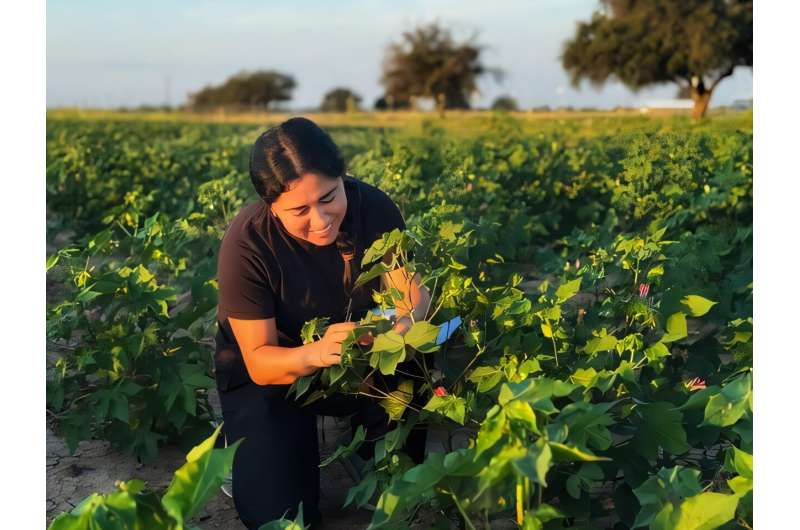Science
Iowa State Scientists Propel Genomic Selection in Crop Breeding

In a significant advancement for agricultural science, researchers at Iowa State University are leveraging genomic selection to enhance crop breeding efforts. This innovative approach aims to develop high-yield, nutritious, and climate-resilient crops necessary for future global food security.
Advancing Crop Improvement Through Genomic Selection
According to Professor Jianming Yu, the Pioneer Distinguished Chair in Maize Breeding and director of the Raymond F. Baker Center for Plant Breeding at Iowa State, genomic selection (GS) is essential in addressing the challenges of modern agriculture. This strategy is rapidly transitioning from theoretical frameworks to practical applications, reshaping crop and animal breeding programs within a relatively short timeframe.
A recent publication titled “Genomic Selection: Essence, Applications, and Prospects” in The Plant Genome highlights the transformative impact of GS. The paper’s lead author, Diana Escamilla, a former post-doctoral researcher in Yu’s lab, now works as a crop breeding specialist in the private sector. The article discusses GS as a method that predicts measurable traits by examining the relationship between a plant’s genetic composition and its observable characteristics.
Harnessing Technology for Future Food Security
Genomic selection increases the ability to evaluate individual crops, significantly shortening breeding cycles. This technique is versatile, allowing for the exploration of genetic diversity, the selection of breeding parents with desired traits, and the adaptation of genetics to anticipated environmental conditions.
“It was exciting to be invited to write this paper to help people understand genomic selection, why it’s important and how it is evolving,” Escamilla stated. “We aim to capture the essence of genomic selection and explain how it allows breeders to respond more quickly and accurately to farmers’ needs and the demands of a growing population.”
Looking to the future, the field of genomic selection is expected to integrate advanced technologies, including artificial intelligence, to create decision-support tools that will enhance breeding efficiency. Initially focused on corn, wheat, and soybeans, this approach has the potential to be applied across various crops crucial for global diets, such as legumes and vegetables.
Professor Yu emphasized the importance of technology training for emerging generations of agricultural scientists. “I am proud of the good work by students like Diana who are helping us carry on the legacy of Iowa State as a worldwide center of leadership in plant breeding,” he said.
As agricultural challenges grow, innovations like genomic selection will be vital in ensuring food security and sustainability for future generations. For more information, refer to the article by Diana M. Escamilla et al, published in The Plant Genome in 2025.
-

 Technology4 months ago
Technology4 months agoDiscover the Top 10 Calorie Counting Apps of 2025
-

 Health2 months ago
Health2 months agoBella Hadid Shares Health Update After Treatment for Lyme Disease
-

 Health3 months ago
Health3 months agoErin Bates Shares Recovery Update Following Sepsis Complications
-

 Technology4 weeks ago
Technology4 weeks agoDiscover 2025’s Top GPUs for Exceptional 4K Gaming Performance
-

 Technology2 months ago
Technology2 months agoElectric Moto Influencer Surronster Arrested in Tijuana
-

 Technology4 months ago
Technology4 months agoDiscover How to Reverse Image Search Using ChatGPT Effortlessly
-

 Technology4 months ago
Technology4 months agoMeta Initiates $60B AI Data Center Expansion, Starting in Ohio
-

 Technology4 months ago
Technology4 months agoRecovering a Suspended TikTok Account: A Step-by-Step Guide
-

 Health4 months ago
Health4 months agoTested: Rab Firewall Mountain Jacket Survives Harsh Conditions
-

 Lifestyle4 months ago
Lifestyle4 months agoBelton Family Reunites After Daughter Survives Hill Country Floods
-

 Technology3 months ago
Technology3 months agoUncovering the Top Five Most Challenging Motorcycles to Ride
-

 Technology4 months ago
Technology4 months agoHarmonic Launches AI Chatbot App to Transform Mathematical Reasoning













